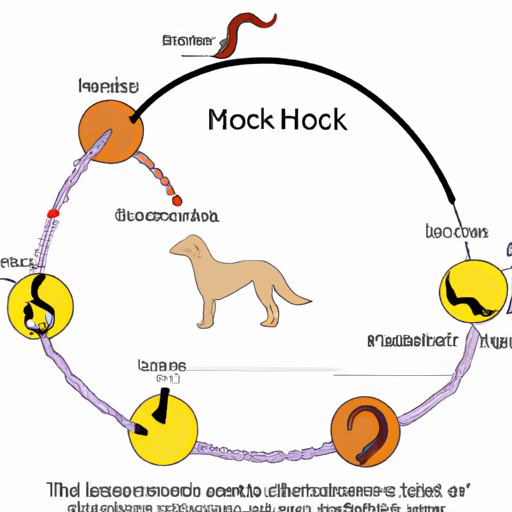Understanding Hookworms
You might have heard about hookworms, but do you know what these parasites are? Hookworms are tiny, thread-like worms that live in the small intestine of dogs. They latch onto the intestinal walls and feed on the blood of their host, causing severe anemia and other health complications.
Here’s a quick overview of the lifecycle of a hookworm:
- The hookworm eggs are expelled from the infected dog’s body through the feces.
- The eggs hatch into larvae in the environment, where they can survive for weeks or even months.
- The larvae can infect other dogs through several routes, which we’ll discuss further.
Routes of Hookworm Transmission
Understanding the ways your furry friend can get hookworms is crucial in preventing the infection. Here are the common routes of transmission:
-
Oral Ingestion: Dogs can accidentally ingest hookworm larvae when they come into contact with contaminated soil, water, or feces. This is particularly common in dogs that have a habit of eating or licking things off the ground.
-
Skin Penetration: The hookworm larvae can penetrate the skin, often through the paw pads or belly. This is why it’s important to make sure your dog doesn’t walk on contaminated soil bare-pawed.
-
Mother to Puppies: The larvae can also be passed from a mother dog to her puppies during nursing.
Recognizing the Signs of Hookworms
As a caregiver, it’s vital to recognize the signs of hookworms in your dog. Here are some symptoms to look out for:
- Loss of appetite
- Weight loss
- Diarrhea, often dark and tarry
- Weakness and lethargy
- Pale gums (a sign of anemia)
If you notice any of these symptoms, it’s important to get your dog checked by a vet as soon as possible.
Preventing and Treating Hookworms
Preventing hookworms is much easier and less stressful than treating them. Here are some ways you can protect your dog:
- Regular deworming: This is especially important for puppies, who are more susceptible to hookworms.
- Cleanliness: Regularly clean your dog’s living area and pick up feces promptly.
- Vet Checks: Regular vet checks can help detect and treat hookworms early.
For treatment, your vet will prescribe a course of deworming medication. It’s important to complete the full course to ensure all the hookworms are killed.
FAQ
Q: Can humans get hookworms from dogs?
A: Yes, humans can get hookworms from dogs, although it’s rare. The larvae can penetrate human skin and cause a condition called cutaneous larva migrans.
Q: Can I prevent hookworms with a vaccine?
A: Currently, there’s no vaccine for hookworms. The best prevention is regular deworming and good hygiene.
Q: How often should I deworm my dog?
A: Puppies should be dewormed every two weeks until they’re three months old, then monthly until they’re six months old. Adult dogs should be dewormed at least twice a year, but your vet may recommend more frequent deworming depending on your dog’s lifestyle and risk factors.



